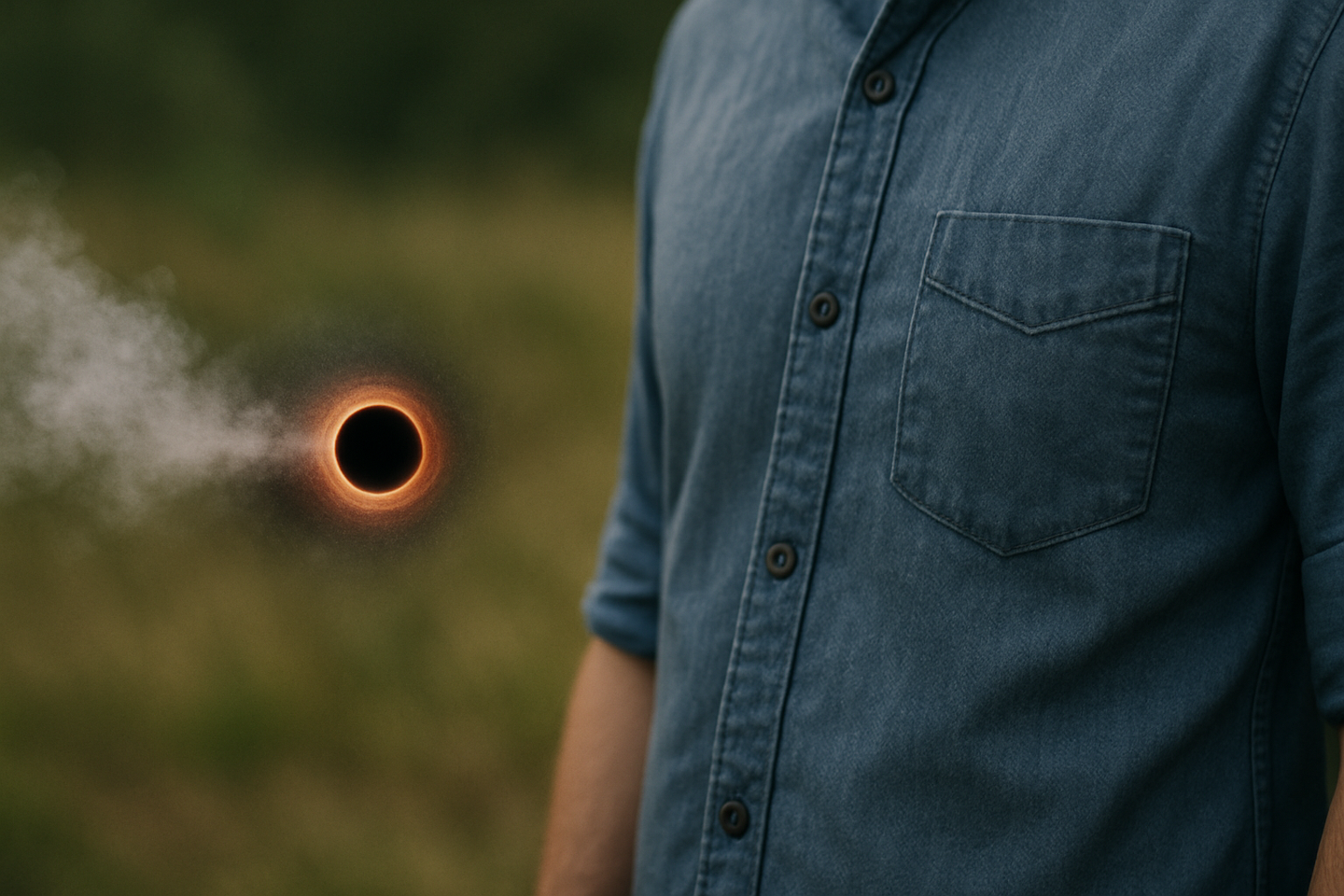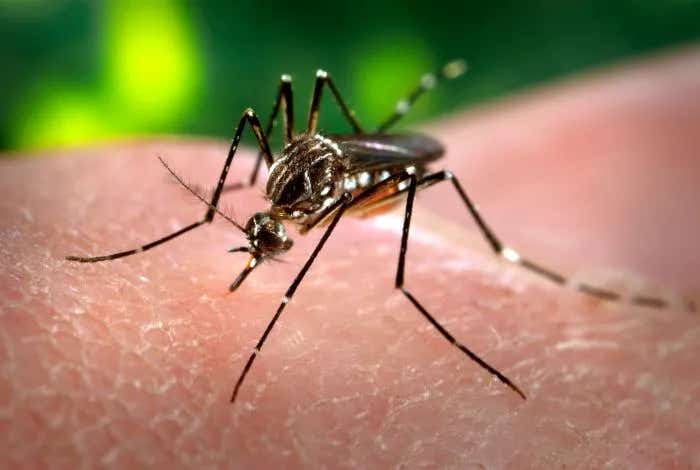If a tiny black hole passed through your body would it hurt you?
A physicist explains whether a tiny black hole could ever pass through your body and what would really happen if it did.

 Edited By: Joshua Shavit
Edited By: Joshua Shavit

A new study reveals whether a primordial black hole could injure or kill you and why the odds of one ever touching you are near zero. (CREDIT: AI-generated image / The Brighter Side of News)
Black holes keep showing up in the news. Scientists have recorded the space ripples from their violent crashes and even captured the first images of their shadowed outlines at the centers of galaxies. These breakthroughs have driven fresh interest in one strange idea: What if some black holes formed near the birth of the universe and still drift through space today?
These ancient objects, called primordial black holes, have become possible suspects for dark matter, the hidden substance thought to make up most of the universe’s mass. You cannot see dark matter, but you can see its pull in how galaxies move and bend light. Some physicists now wonder if dark matter could be made of countless tiny black holes left behind after the Big Bang.
That question leads to another that sounds pulled from science fiction. If black holes fill space, could one ever hit a person? And if so, what would happen?
Primeval Objects from the Birth of the Universe
Unlike the black holes formed when stars collapse, primordial black holes may have emerged from dense clumps of matter in the universe’s first seconds. They could weigh as little as an asteroid or as much as a star.
But physics places tight limits on which of those could still exist. Any black hole smaller than about a grain of dust in mass would have vanished long ago through a slow energy leak known as Hawking radiation. Larger ones, however, might still survive.
Observations from space also rule out heavy candidates as main sources of dark matter. What remains is a narrow range of possible weights, often called the asteroid-mass window. These black holes would weigh roughly the same as large space rocks yet be far smaller than an atom.
That strange combination makes one question unavoidable. If such a thing passed through your body, would it hurt?
Putting Fear to the Test
Physicist Robert Scherrer at Vanderbilt University decided to answer that question seriously. He published his results in the International Journal of Modern Physics D.
“I wanted to see if this would be possible,” Scherrer said, recalling a science fiction story from his youth where a man is killed by a passing black hole. “Recent observations of gravitational radiation from black hole mergers, as well as new images of black holes, have revived interest in the subject of black holes in general.”
Scherrer focused on gravity alone. He did not include radiation or heat from the black hole. He asked a simpler question: How heavy must one be to injure or kill you using gravity only?
His work builds on a past study with Jagjit Singh Sidhu and Glenn Starkman at Case Western Reserve University, where they looked at large dark matter objects that could damage humans. Since no one has ever been injured by such matter, the team used that fact to tighten the limits on dark matter theories.
This time, the subject was more extreme.
A Bullet Made of Gravity
A primordial black hole that drifts through space would move fast, about 200 kilometers per second. That speed would carry it through your body in a flash.
At that pace, it would disturb the matter around it, forming a shock wave much like a bullet ripping through tissue. Scherrer calculated how much energy the black hole would release as it moved through the body, which he treated as mostly water.
Then he compared that energy to a known injury standard: a gunshot. A small rifle bullet carries around 100 joules of force, enough to cause serious harm.
Working backward, Scherrer found that a black hole would need to weigh at least 140 quadrillion grams to deliver similar damage. Anything smaller would slide through without leaving much trace.
At that weight, the black hole would still be tiny, far smaller than an atom. Yet its speed would make it deadly in the same way a bullet is deadly.
“A sufficiently large primordial black hole, about the size of an asteroid or larger, would cause serious injury or death if it passed through you,” Scherrer said. “It would behave like a gunshot.”
Twisting Cells with Gravity
A second danger comes from tidal force, the uneven pull of gravity. The side of a cell closer to a black hole would feel a stronger tug than the far side. If that stretch grows large enough, it can tear the cell apart.
Scherrer looked closely at brain cells, which are among the body’s most delicate. Studies show that even tiny forces acting briefly can damage them.
To reach that level of strain, the black hole would need to be far heavier than one that makes a damaging shock wave. Its mass would have to be between seven quintillion and 70 quintillion grams.
At that weight, it could disrupt cells directly. But by then, the crashing shock wave would do severe damage first.
In simple terms, the shock wave is more dangerous than the stretch.
So Why Are You Still Here?
If black holes exist in this size range and if they make up all dark matter, you might wonder why one has never struck a person.
Scherrer answered that too.
He combined estimates of dark matter density near Earth, human body size, world population, and black hole speed. Even under the most extreme assumption that every bit of dark matter is made of these black holes, the math gives a startling result.
The chance of one hitting a person is about once every 100 million trillion years.
That is longer than the life span of stars, planets, and likely the universe itself.
“A smaller primordial black hole could pass through you, and you wouldn’t even notice it,” Scherrer said. “The density of these black holes is so low that such an encounter is essentially never going to happen.”
A Calm Ending to a Cosmic Fear
The idea of a black hole tunneling through your body may sound terrifying. Physics, however, is on your side.
Gravity is weak. The universe is vast. And these objects, if they exist at all, are rare beyond imagination.
Black holes may dominate the headlines and rewrite textbooks. But in daily life, their threat to you is as close to zero as science can measure.
You may never stop wondering what dark matter truly is. At least now you can stop wondering whether one will pass through you.
It will not.
Research findings are available online in the journal World Scientific.
Related Stories
- Our universe may have been born inside a black hole, study finds
- What happens to matter when it gets sucked into a black hole?
- A wormhole from another universe? Scientists revisit the puzzling black hole GW190521
Like these kind of feel good stories? Get The Brighter Side of News' newsletter.
Joseph Shavit
Writer, Editor-At-Large and Publisher
Joseph Shavit, based in Los Angeles, is a seasoned science journalist, editor and co-founder of The Brighter Side of News, where he transforms complex discoveries into clear, engaging stories for general readers. With vast experience at major media groups like Times Mirror and Tribune, he writes with both authority and curiosity. His writing focuses on space science, planetary science, quantum mechanics, geology. Known for linking breakthroughs to real-world markets, he highlights how research transitions into products and industries that shape daily life.



